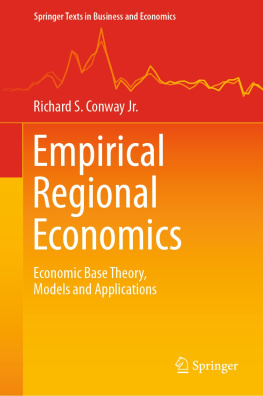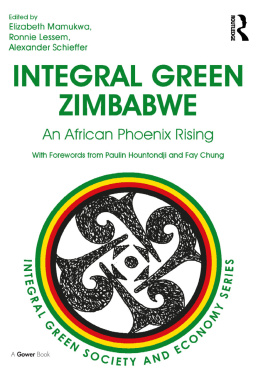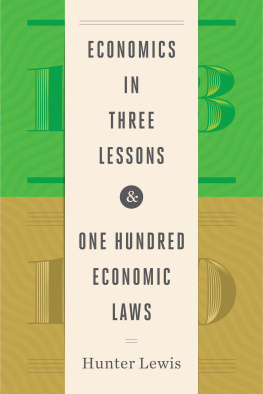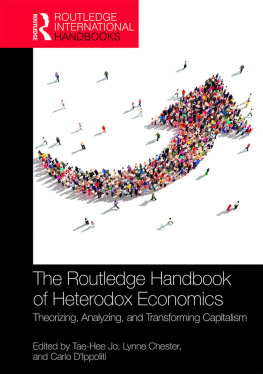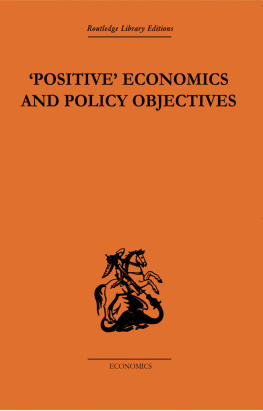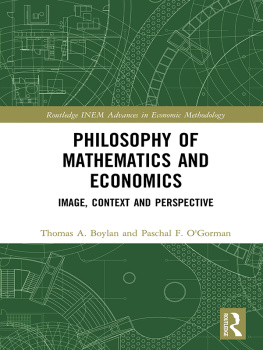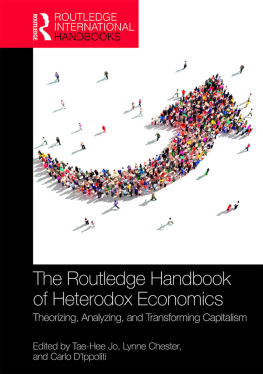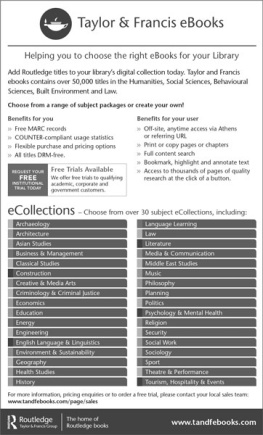Integral Economics
Transformation and Innovation Series
Series Editors:
Ronnie Lessem, University of Buckingham, UK
Alexander Schieffer, University of St. Gallen, Switzerland
This series on business transformation and social innovation comprises a range of books informing practitioners, consultants, organization developers, and academics how businesses and other organizations set in the context of whole economies and societies can and will have to be transformed into viable 21 st Century enterprises. A new kind of R&D, involving social, as well as technological innovation, needs to be supported by integrated, active and participative research in the social sciences. Focusing on new, emerging kinds of public, social and sustainable entrepreneurship originating from all corners of the world and from different cultures, books in this series will help those operating in the area of interface between business and society to mediate between the two in the way that business schools once did until, as is now argued, they lost their way and business leaders came, in many cases, to be seen as at best incompetent and at worst venal and untrustworthy.
Integral Economics
Releasing the Economic Genius of Your Society
RONNIE LESSEM AND ALEXANDER SCHIEFFER
GOWER
Ronnie Lessem and Alexander Schieffer 2010
All rights reserved. No part of this publication may be reproduced, stored in a retrieval system or transmitted in any form or by any means, electronic, mechanical, photocopying, recording or otherwise without the prior permission of the publisher.
Ronnie Lessem and Alexander Schieffer have asserted their moral rights under the Copyright, Designs and Patents Act, 1988, to be identified as the authors of this work.
Gower Applied Business Research
Our programme provides leaders, practitioners, scholars and researchers with thought provoking, cutting edge books that combine conceptual insights, interdisciplinary rigour and practical relevance in key areas of business and management.
Published by
Gower Publishing Limited
Wey Court East
Union Road
Farnham
Surrey, GU9 7PT
England
Ashgate Publishing Company
Suite 420
101 Cherry Street
Burlington,
VT 05401-4405
USA
www.gowerpublishing.com
British Library Cataloguing in Publication Data
Lessem, Ronnie.
Integral economics : releasing the economic genius of your society. -- (Transformation and innovation)
1. Economics. 2. Economics--History.
I. Title II. Series III. Schieffer, Alexander.
330.1-dc22
ISBN: 978-0-566-09247-3 (hbk)
ISBN: 978-0-566-09248-0 (ebk)
ISBN: 978-1-409-45979-8 (ebk-ePUB)
Library of Congress Cataloging-in-Publication Data
Lessem, Ronnie.
Integral economics : releasing the economic genius of your society / by Ronnie Lessem and Alexander Schieffer.
p. cm. -- (Transformation and innovation)
Includes index.
ISBN 978-0-566-09247-3 (hardback) -- ISBN 978-0-566-09248-0
(ebook) 1. Economics. 2. Social policy. 3. Sustainable development--Social aspects. I. Schieffer, Alexander. II. Title.
HB171.L634 2010
338.927--dc22
2010015769

Printed and bound in Great Britain by
MPG Books Group, UK
Contents
List of Figures
About the Authors
Professor Ronnie Lessem is a graduate of Harvard Business School and the London School of Economics. He has been an adjunct professor at IMD, Lausanne and is now Director of the Trans-cultural Centre and programmes at the University of Buckingham, UK. Ronnie Lessem was the managing director of a clothing business in South Africa and he has acted as a consultant and adviser on organisational learning, knowledge creation and cross-cultural management to international companies such as the Anglian Water Group in the UK. He is currently working with Virgin Group companies. Professor Lessem has written over twenty books on subjects including organisational development, change and transformation.
Dr Alexander Schieffer studied economics, business administration, law and social sciences at the University of St Gallen in Switzerland. He also gained a Doctorate in Leadership at St Gallen. He has lived and worked in various continents and has broad experience in a range of industries, from investment banking to the media industry. The latter includes the setting up of a publishing house in Singapore, which he ran for three years, and subsequently sold to a major Chinese media group. Dr Schieffer is a member of the Society for Organisational Learning and the World Business Academy. He has published a variety of articles and books in the last ten years.
Both authors run doctoral programmes at Bethel University, USA , and Buckingham University, UK on Social and Economic Innovation, and are currently designing curricula for sustainable business and economics at Sekems Heliopolis University in Egypt. They are co-founders of the Geneva-based TRANS4M Four World Center for Social Innovation. www.trans-4-m.com
Acknowledgements
We would like to thank our co-creators and research associates from all over the world. Our personal interaction with all of them has helped us shape our thinking. This goes in particular for Dr Sam Rima from Heliopolis University in Egypt, for Chidara Muchineripi and Steve Kada from the Chinyika Community in Zimbabwe, for Mfuniselwa Bhengu MP in South Africa, for Professor Adel Al-Rasheed from Jordan, for Reza Moussavian from Detecon International in Germany, for Peter Brew from the IBLF International Business Leaders Forum, now based in Hong Kong and for Dr Mike Lucas from the Open University in the UK.
Further, we thank Martin West, senior editor of Gower Applied Research, for his invaluable support for this book and the entire series and Simone Holstein for her contribution to the layout.
A final and warm thank you to our wives and life partners and their ongoing support for our work. Ronnie is forever appreciative of his wife Joeys ability to listen, as the profound psychotherapist that she is, into all the different worlds into which he enters. Alexander is deeply thankful to Rama, herself an accomplished political scientist and activist, for her critical comments on the book and being his constant source of inspiration.
This book is dedicated to all the originators of new economic theory and practice on whom we build in the course of this book from the South, East, North, West and Center of our World and who are, like us, committed to bringing about economics, and an economy, that benefits all.
Their conceptual work and living examples have been our constant inspiration for this book.
Prologue
AWAKENING!
Towards a New Economic Paradigm
Mainstream free market theory suffers from a conceptualization failure, a failure to capture the essence of what it is to be human.
Muhammad Yunus
Caught in One World: The Failure of the Economic Profession
On the 10 August 2009, a group of distinguished UK economists among them Geoffrey Hodgson, Paul Ormerod and Bridget Rosewell jointly wrote an open letter to the Queen of England. With this letter, they responded to the Queens question of why so few economists had foreseen the current financial and economic crisis:
We believe that the narrow training of economists which concentrates on mathematical techniques and the building of empirically uncontrolled formal models has been a major reason for this failure in our profession. This defect is enhanced by the pursuit of mathematical technique for its own sake in many leading academic journals and departments of economics. There is a species of judgment, attainable through immersion in a literature or a history that cannot be adequately expressed in formal mathematical models. Its an essential part of a serious education in economics, but has been stripped out of most leading graduate programs in economics in the world, including in the leading economics departments in the United Kingdom. Models and techniques are important. But given the complexity of the global economy, what is needed is a broader range of models and techniques governed by a far greater respect for substance, and much more attention to historical, institutional, psychological and other highly relevant factors As trained economists and United Kingdom citizens we have warned of these problems that beset our profession. Unfortunately, at present, we find ourselves in a minority.
Next page

